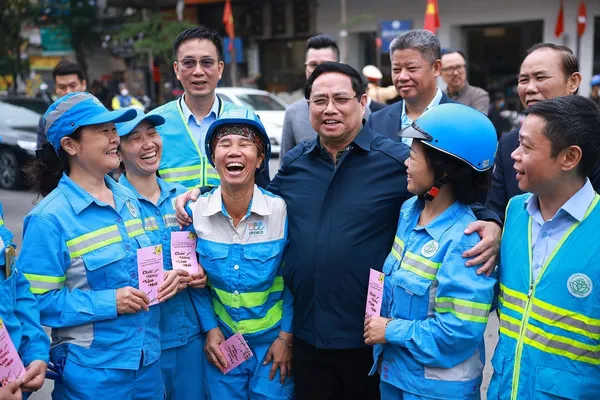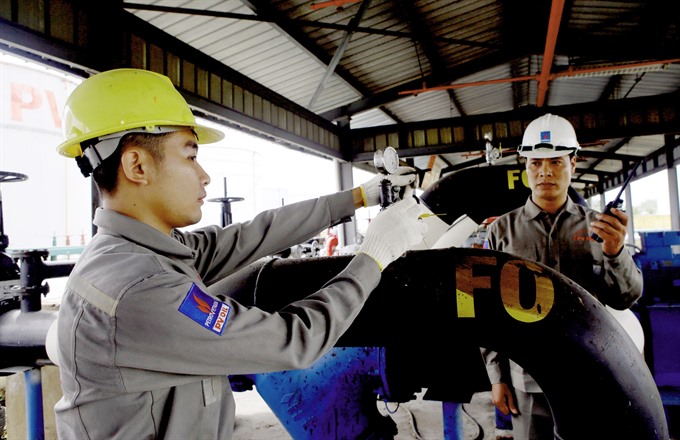 Economy
Economy

In yet another equitisation rush for State owned enterprises (SOEs), experts advised companies on the verge of becoming listed to revise their financial situations and revaluate their assets before going public.
 |
| Workers at PV Oil’s Dung Quất Refinery. — VNA/VNS Photo Huy Hùng |
HÀ NỘI —State-owned enterprises (SOEs) in line for equitisation and listing should review their financial situation and re-evaluate their assets before going public, experts say.
SOE equitisation is seen as an effective solution for increasing productivity, promoting economic restructuring, attracting investment and encouraging private sector growth.
As such, accurate evaluation of the firms’ financial value before the equitisation process is crucial because they form the foundation for later actions including the issuance of shares and dividends.
For the time being, appraisal and auditing by the State Audit Office of Vietnam (SAV) are considered the main tools of assessment in deciding the SOEs’ equity and asset values.
This means the SAV is charged with finding the true worth of SOEs and dealing with any problems that arise during their equitisation process in a timely and accurate manner.
Based on the SAV’s 2016 findings, there are still limits on the accuracy of evaluating an SOE, especially involving brand name and value, business competitiveness, financial investment, land use and assets pricing.
The office found some incongruence between different Government departments and agencies in charge of SOE equitisation that appropriate authorities should look into, State Auditor General Hồ Đức Phớc said at a workshop on Monday.
Additional policies and regulations are needed to prevent undervaluation of SOEs, Phớc said.
Millions in difference
Some experts believe a few SOEs have been underpriced, and with proper auditing, millions of US dollars worth of corporate value can be raised for better evaluation and pricing before these are officially listed on the stock exchange.
At Monday’s workshop, Nguyễn Anh Tuấn, Sector VI Auditor General at the SAV, said that in investigating eight SOEs, they found a difference of VNĐ8.45 trillion (US$376 million) in capital between the SAV’s result and the companies’ own figures.
One such company, the Bình Sơn Refining and Petrochemical Company Limited (BSR), had VNĐ4.58 trillion ($204 million) in State capital added by the SAV to make a total of VNĐ44.9 trillion ($2 billion).
Several other big names including PetroVietnam Power Corp (PV Power), PetroVietnam Oil Corporation (PV Oil) and Vietnam Rubber Group (VRG), have also been assigned new values by the SAV, with the difference amounting to VNĐ2 trillion ($89 million), VNĐ512 billion ($22.8 million) and VNĐ440 billion ($19.5 million), respectively.
Tuấn explained the discrepancies as results of inadequate information, different time periods within the financial year, and an overall misunderstanding between appraiser and auditor.
Proposing a solution, Nguyễn Ngọc Tuấn, Chairman of the Vietnam Valuation Association (VVA), said there should be at least two methods of appraising and auditing SOEs, with one produces the main results while the other produces comparative figures.
For example, by using two auditing methods simultaneously, the SAV generated completely different results for the Saigontourist Cable Television Company Limited and the Vienam Television Cable Corporation, two out of the eight SOEs mentioned earlier.
In particular, the SAV applied an evaluation method based on discounted cash flows instead of corporate assets, and found a difference of VNĐ400 billion ($17.8 million) across both companies, which means the old method would yielded an undervalued assessment of the companies’ capital.
Nonetheless, the SAV has not asked authorities to make this a compulsory step, but rather that companies undergo more detailed scrutiny before they are approved for equitisation.
The office explained that should SOEs be forced to alter existing records immediately after the new audited results are released, they would face immense pressures of assets depreciation and increased production costs, ultimately leading to revenue deficits, as the value of their equity increases while other quantitative assets remain the same.
It said that in the coming time, the number of re-examined SOEs will increase to around 80, as a new Decree 59/2017/NĐ-CP decreases the value of a company’s equity that would subject it to State audit from VNĐ5 trillion ($222.2 million) down to VNĐ1.8 trillion ($80.1 million).
No magic cure
Brian McEnery, Global President of the Association of Chartered Certified Accountants (ACCA), said that based on experiences from other countries, equitisation and public listing of companies should not be considered a magic cure for unproductive SOEs.
He said that in theory, the process of equitisation itself may help with the companies’ decision making, leading to a more practical business model and a stronger, diversified capital flow. But all such possibilities can only happen with a solid strategy, business management solutions and effective support from the government. — VNS




